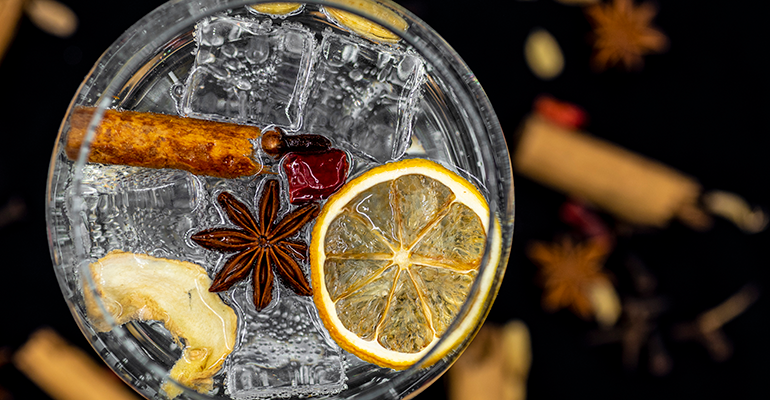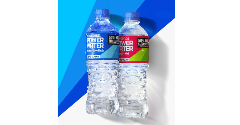News
As Gen Z shies away from alcoholic drinks exotic flavours are the big draw
11 Mar 2024With Gen Z drinkers proving to be the driving force behind the sober curious movement, we spoke to Bax Botanics, an artisanal distiller of zero-alcohol botanical beverages, to find out what appeals to its younger drinkers.
Recent research by market intelligence provider Mintel into UK Gen Z lifestyles shows that younger British consumers are increasingly shunning alcohol. A consumer survey it conducted showed that those aged 18 – 24 are half as likely to prioritise spending on alcohol, compared to those aged over 75.

With the same survey showing that 36% of Gen Z consumers like to socialise in pubs and bars, the research points to the fact that this group is more open to the idea of enjoying the social aspect of drinking without alcohol.
Gen Z are open to a new generation of zero alcohol drinks
The Mintel research still indicates younger consumers are drinking alcohol, but it also points to the fact that they are equally open to trying a new generation of fruit juice and botanical-based drinks that are high in flavour, but without the alcohol content.
Greater awareness of the health implications of alcohol, combined with an increased interest in drinks that have a higher nutritional profile, and a lower calorie count are adding to the reasons why these types of drinks are proving popular.
Rose Bax, co-founder of Bax Botanics, believes that its gin-inspired line is proving to be particularly popular with Gen Z and younger consumers who want to enjoy the socialisation of drinking, while hitting the markers for both nutrition and flavour.
“I think the variety of alcohol-free cocktails that is being offered by Bax Botanics appeals to the sense of celebration that people want to feel when they go out,” Bax said. “People want to have an equally appealing drink as other folks in the bar, but they won't compromise on taste.”
Embracing interest in more exotic botanical blends
Bax went on to explain how the brand uses a distillation process that blends adventurous botanical extracts to produce an enhanced flavour that appeals to the Gen Z desire to explore something new, while staying away from alcohol.
“The range offers people a choice of pure, sugar-free botanical flavours that are a little gin-like to taste but much more interesting,” Bax said. “Gin flavours are great but exploring different, new flavours is exciting and new to Gen Z drinkers - Bax Botanics Verbena is refreshing and zingy, like the scent of a summer meadow! and Sea Buckthorn is mellow and aromatic with flavours of Mediterranean herbs, bitter orange, and sea buckthorn berries. On top of this, they are also 0.00%abv, vegan friendly, gluten-free, and super ethical.”
Gen Z are experimenting with beverage flavours
Mintel’s research concurs, finding that a number of Gen Z consumers are shunning alcohol in favour of healthier carbonated drinks, blended fruit juices and energy drinks.
Interesting botanical flavours are certainly appealing to Gen Z. Bax highlights that its Verbena range appears to be more popular with this group. The blend also includes mint, fennel, and subtle florals that are used in a wide range of Garden Spritz style cocktails, which bartenders are serving with edible flower and leaf garnishing, for added appeal.
So, what kind of flavours have Bax Botanics consumers shown a preference for so far?
“I would say probably Bax Verbena is a whisker more popular, probably because the punchy botanical flavours are being used in many 'Garden Spritz' style cocktails,” said Bax. “The lemon verbena, mint, fennel and subtle florals in the distillation blend well with spritzes.”
The future of non-alcoholic beverages
Mintel research points to the fact that the future growth of the non-alcoholic beverage market is most likely to lie with Gen Z consumers, who will be the driving force behind the move to this new generation of healthier beverages.
Bax Botanics believes that shelf life will also play a significant part in the future success of brands, particularly those offering non-alcohol alternatives, while the space will remain highly competitive.
“The development of more shelf stable products must happen. Bax Botanics is shelf stable and has 6 months from opening but many other offerings in this space need refrigeration, which makes it more challenging for the hospitality trade,” said Bax.
“Doubtless the big alcohol brands will dominate the category with 0.00% copies of their popular spirits and some smaller brands will fall by the wayside, but I hope consumers and trade will continue to enjoy the smaller producers' products as these artisans bring creativity to the drinks industry and something different for consumers.”
Related news

Oat Barista: Innovation for game-changing beverages
20 Nov 2025
Oat Barista is a clean label, sustainable, and innovative drink base specifically designed to create the perfect foam in one single ingredient.
Read more
How younger consumers are redefining ingredient choices and rejecting brand loyalty
18 Nov 2025
Gen Z and millennial consumers’ preferences for transparency, functionality, and purpose are “redefining the very nature of consumption itself”, says SPINS.
Read more
Hybrid formats and flexible positioning to disrupt category norms in 2026
17 Nov 2025
Trend forecasters expect food and drink to move more fluidly across occasions, functions, and formats as consumers seek versatility, novelty, and convenience.
Read more
Danone highlights digestive health as potential ‘tipping point’ for food industry
13 Nov 2025
Danone is betting on a food industry “tipping point” that will bloat the market for healthy products, particularly those related to gut health.
Read more
New UPF standard hoped to offer consumers ‘coherence and clarity’
10 Nov 2025
Ingredients companies are being urged to enter “a new era of partnership and innovation” following the launch of the industry’s first non-UPF verification scheme.
Read more
Faravelli at Fi Europe: Showcasing FARA® functional solutions for food and nutra
28 Oct 2025
At Fi Europe 2025 in Paris (stand 72M39), Faravelli showcases FARA® Customized Functional Solutions and a wide ingredient portfolio for food and nutra – delivering quality, innovation, and expertise.
Read more
Agrigum Redefined FIBER
27 Oct 2025
Agrigum has transformed gum acacia into a natural, science-backed fibre that supports gut health, sustainability, and innovation across global food and nutrition applications.
Read more
Expanding boundaries in food & beverage innovation
23 Oct 2025
IMCD and FrieslandCampina Professional expand partnership to deliver Kievit® across EMEA, enabling brands to enhance quality and accelerate time-to-market for tomorrow’s food & beverage creations.
Read more
Amazon Grocery launch aims to balance quality with affordability
22 Oct 2025
Global e-commerce giant Amazon has introduced a new private-label food brand, combining existing Amazon Fresh and Happy Belly products with new everyday items.
Read more
Powerade enters hydration space with launch of Power Water
21 Oct 2025
Coca-Cola’s Powerade brand has launched a zero-sugar, electrolyte-enhanced functional water, marking the brand's entry into the hydration space.
Read more